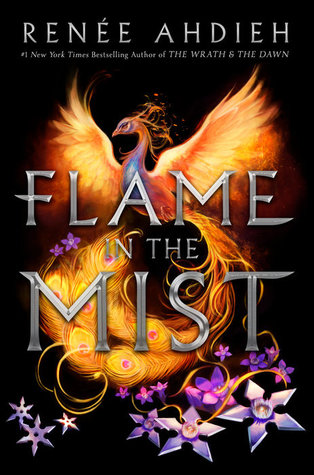
Did the people who read this book read a different book than the one I read? Because I did not get a romantic, action-packed adventure. I got a slow and plodding story with wooden characters and writing that was rife with purple prose. It wasn't even the fact that I went in with high expectations; despite the fact that Mulan is one of my favorite movies, I really did not like this author's other book, THE WRATH AND THE DAWN, and that was based off one of my favorite faerie tales. So I went in with extremely low expectations and somehow, FLAME IN THE MIST managed to be worse than TWatD. How does that happen?
Also, let's talk about the Mulan thing. I noticed people were saying that this book was a retelling of Mulan, and I wasn't sure if it was the publisher saying that or other reviewers saying that (because reviewers say a lot of things that publishers aren't and shouldn't be held responsible for), but when I went to the Penguin website, they appear to be blurbing the book as "Mulan meets Throne of Glass" and the author herself appears to be citing her love of the movie as an influence in writing this book in this Bustle interview. That made me give this book the side-eye, because Mulan is a legend from China and this is a book about Japan. China and Japan have totally different cultural legacies and at several points throughout history they have clashed in very unpleasant ways. It felt extraordinarily insensitive to me to brand a Chinese legend in new, Japanese packaging. To give a Western example, it would be like taking the struggles of the Scottish and rebranding them as English.
"Be as swift as the wind. As silent as the forest. As fierce as the fire. As unshakable as the mountain" (244).
I really don't like it when I feel like I'm being pandered to. Especially when it feels culturally insensitive. I'm sure that wasn't the author's intention, but I think that sometimes people forget that Disney stories are often based off actual folklore from actual people.
FLAME IN THE MIST is about a girl named Mariko who is the daughter of a samurai. She's on her way to be married to her betrothed, but her litter and attendants are slaughtered before she can reach her destination, and Mariko herself is saved only by sheer luck. She ends up lost and wondering, and after escaping a would-be rapist, decides to disguise herself as a boy. Lucky for her (again), because Mariko ends up in the camp of the very men who she believes were trying to kill her, a group of bandits called the Black Clan. She decides that she's going to gain their trust and learn their weaknesses so she can kill them in revenge, but this being a YA novel, she falls for the ringleader.
Mariko is no Mulan. She's one of those "strong" female characters who prove their "strength" by whining about how much it sucks to be a girl. She is constantly shooting off her mouth, even when she shouldn't (especially when she shouldn't), and of course her would-be enemies think this is so hilarious and endearing and are won over instead of gagging her and/or throwing her off a bridge. Also, the plot is very similar to WRATH OF THE DAWN in the sense that Mariko, like Sharzad, has a lot of reason to hate the leader, but never does, at least not without conviction, and gives into her lust way too quickly. Her emotions do not feel real - it's like she has an internal switch that flips whenever it's convenient for the plot, and also, what is going on with the plot of this story? It was so slow. I skimmed, and it still felt way too long. The writing does not help. Ahdieh makes an effort to write poetically, but instead it just feels blocky and convoluted and weird.
But the egg - that simple egg - was so wonderful. So perfect.
How could anyone who would take such care to prepare a simple egg truly be bad? (106)
Also, negative points for that line. Because apparently people can't be bad if they can cook eggs.
1 out of 5 stars
No comments:
Post a Comment
Note: Only a member of this blog may post a comment.